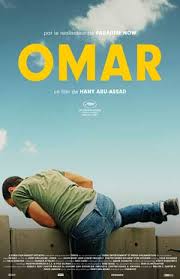
OMAR
Palestine, 2013, 96 minutes, Colour.
Adam Bakri, Leem Lubani, Samer Bisharat.
Directed by Hani Abu- Assad
Some years ago, Nazareth-born Arab director, Hany Abu Assad, made a very powerful film about Palestine called Paradise Now. He took the audience into a Palestinian village and introduced them to various families, especially to young men who have committed themselves to be suicide-bombers. It showed the making of videos explaining their motivation for their sacrifice, their getting through into Israel, and the decision of one not to carry on with the mission while the other did. It was a cinematic introduction to the world of suicide-bombers.
In this film, Omar, a Palestinian, is seen immediately climbing over the wall which divides Israel from Palestine. He is a young baker, who is wanting to visit a young girl, still at school, to whom he is attracted. He also wants to meet her brother, Tarek, a friend from childhood, who is involved in plans to target Israelis. A third man, Amjad, has also been a friend from childhood.
The three plan to ambush an Israeli and kill him. When they do confront their victim, decisions have to be made as to who will do the actual shooting, a personal dilemma. Soon, on the is pursued, especially in his wall-climbing, and chased through the town. When he is caught, he is tortured, is interrogated, and experiences something of a brainwashing though he thinks he is resistant to it. His interrogator uses methods familiar as good-cop, bad-cop, threatening Omar and then engaging with him rather personally. Omar experiences prison which also has its influence on his outlook.
On his release, the interrogators have an expectation that he will supply information to them. He does not want to, but feels the pressure. This is complicated when he finds that his girlfriend suspects that he is an informer and begins a liaison with his friend Amjad.
The interrogator keeps in touch with, Omar who is also approached by local Palestinian authorities who know quite a deal about him and want information from him.
This is sometimes powerful story of contemporary young man in a most difficult situation, with his traditions and loyalties, with the experience of Israeli occupation and dangerous environments, and the possibilities for his own life and future, prospects which are continually under threat.
1. A Palestinian perspective on Israel- Palestine tensions? Characters, situations, crises? The Palestinian director and his perspectives? Previous films?
2. The visuals of Palestine, of Israel, the towns and the contrasts in each territory? The presence of the wall, its height, its length, the checkpoints? Homes on each side? Shops? The role of the police, the borders, the Israeli police? The Palestinian authorities? Interrogations, prison? The feel of the place and the tensions? The musical score?
3. The title, the focus on Omar? Climbing the wall? Palestinian, his age, his friends from childhood? His work in the bakery? Terek’s sister, Nadia, and his love for her, climbing the wall to visit? The friends, their pledge, their meetings, plans, the ambush, the shooting – and the decision as to who would do the shooting?
4. Climbing the wall, the police seeing Omar, the chase through the town, his eluding the pursuit? His being caught, the interrogations, hanging up, the torture, wanting him to talk, the pressures? The methods of torture? The intelligence officer, getting information, the range of informers? The pressure to inform?
5. Omar, imprisoned, his experience there, the fellow prisoners? The interrogator and his continued contact, seeming friendliness? Omar complying, lies and confusion? Getting out, the meeting, Terek, tracking him down, Amjad and his being with Nadia, Nadia and her response? His going to the school, seeing her with the girls, chattering? His love for her?
6. Omar and his reputation, his being checked on, information, leading and misleading? The interrogator and his concern? The family, their response? Frequently being picked up, his own confusion, information or not, the interrogator, the personal touch, information about his family? The contrast with the Palestinians and their seeking information?
7. Terek, his escape, Omar going to see him? With Amjad, after his disappearance? The fight, the shooting, Terek’s, the decision not to bury him, to freeze his body for 60 days? This information coming to the Palestinians, their questioning Omar? Amjad, his disappearance, the news that Nadia was pregnant to him?
8. The buildup to the big strike, the ambush and plans? The bluff?
9. Omar, his family, going to work, Nadia and her reaction?
10. Nadia, her age, going to school, her place in the family, serving, with Terek? Omar and his love for her? The truth about her pregnancy, Omar coming to the family, making the proposal for Amjad to marry her? Her consent?
11. The years passing, Omar and his life, re-visiting, meeting Nadia, the children, Amjad and his death? Omar and his regrets?
12. Audience, presuppositions about Palestine and Israel, the political situation, oppression, the role of the authorities, police, Palestinian response to Israel, – but seen in the light of the human story?